The Best of C. L. Moore Book Review
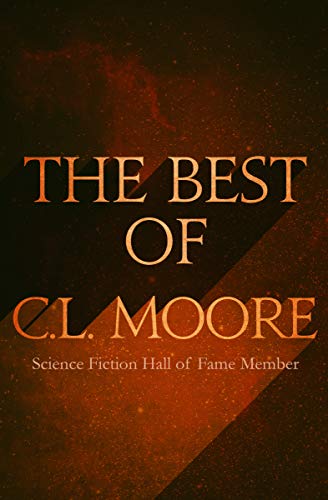
The Best of C. L. Moore
by C. L. Moore
452 pages
Published by Diversion Books (September 22, 2015)
ASIN B07H15QVLC
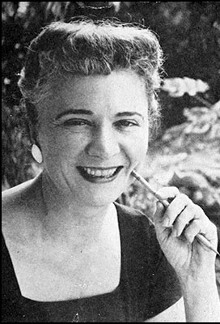
Catherine Lucille Moore
By Source, Fair use, https://en.wikipedia.org/w/index.php?curid=34553491
I had heard of Catherine Lucille Moore, but this was my first exposure to her work. I saw this collection of her short stories come on sale on Amazon, so I decided to give it a try.
In my typical fashion for a short story collection, I’ll do a short review of each story, and then look at the collection as a whole.
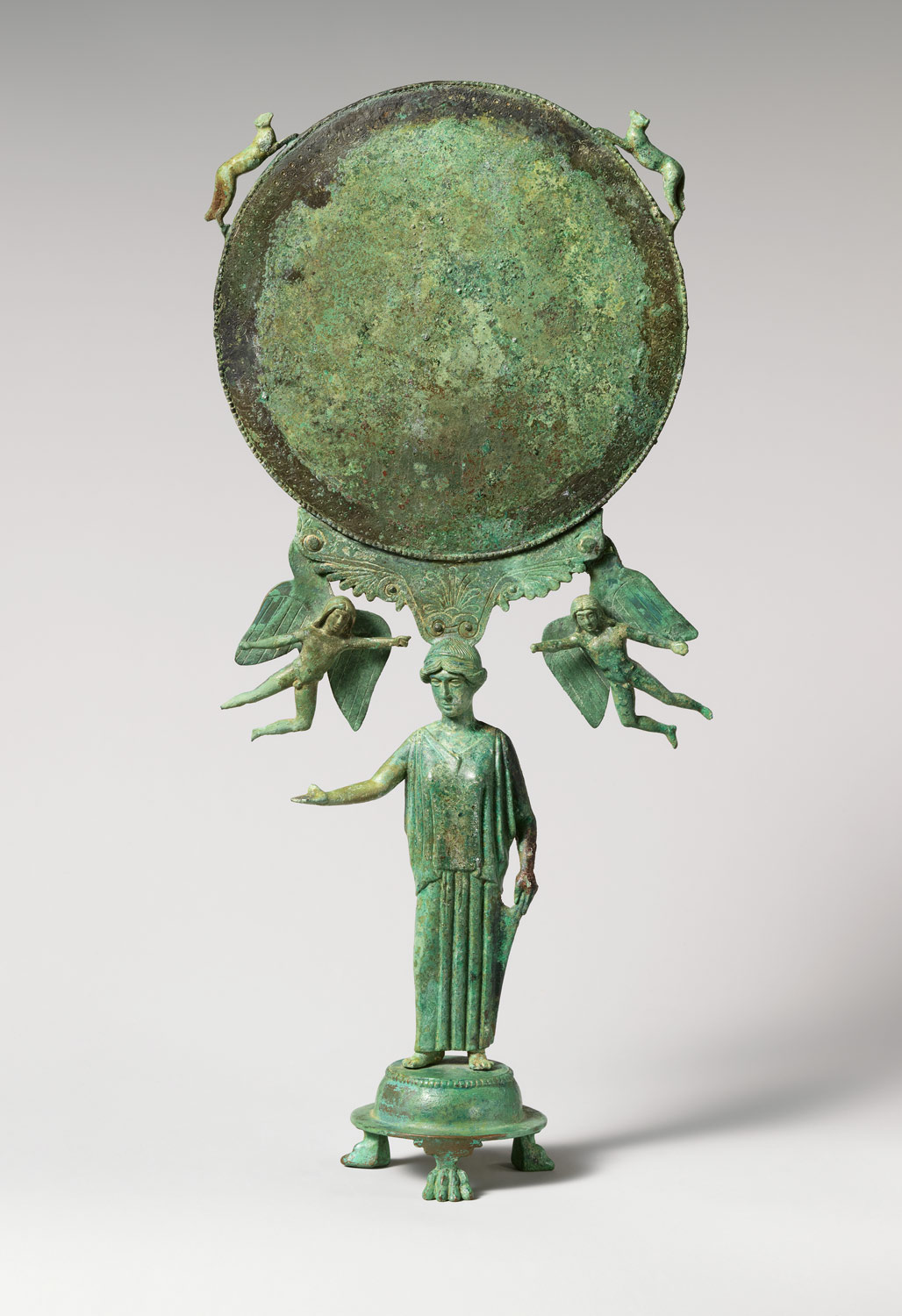
Shambleau *****
Not only is this story my introduction to Moore’s work in general, it is my introduction to one of her most famous characters, Northwest Smith. N.W., as his partner-in-crime Yarol calls him, is very much the anti-hero. I call him an anti-hero insofar as he doesn’t particularly demonstrate the chivalry of other nearly contemporaneous characters like the Geste brothers. However, I think you could almost as accurately call him a hero, if the hero you have in mind is someone like Odysseus.
Northwest Smith is a pirate and a smuggler, a desperado of renown. Like Odysseus, he is cast adrift from his home. He definitely shoots first and then neglects to ask any questions. He is happy to lie to your face and then rob you blind. He is not, however, a force of random destruction, he just is wholly out for himself. In the pre-Christian moral universe of the Homeric Greeks, N. W. would have fit right in. However, he does not actually live in that moral universe, but in one whose foundation is Christianity, which is a thematic element we will return to later.
In addition, the story itself is a re-working of Greek legend, but with an eldritch horror element that feels quite natural here. Greek myth itself doesn’t have the existential dread of living in a universe that contains many things older than, more powerful than, and also indifferent at best to man, but it readily compatible with it. The Greek Gods were anthropomorphic, but often cruel and indifferent. However, the real monsters do not even rise to that level.
“Shambleau” uses the venerable conceit that old stories often contain a gem of truth. Stories in this vein treat their subjects as not at all metaphorical. With suspension of disbelief, such a story can be strange and frightening because you can imagine it to be mostly true. Many of my favorite authors have recycled myth and history to great effect, and Moore does an excellent job here. Even more remarkable, since this was her first commercial sale. “Shambleau” is one of the stories almost everyone talks about when speaking of C. L. Moore’s work, and I think it a remarkable piece. I can see why Moore had such a long career and so much influence on other authors.
Black Thirst ***
Whereas “Shambleau” had a touch of eldritch horror, “Black Thirst” is quite simply Lovecraftian. This is the second Northwest Smith tale, and in typical planetary romance fashion, it is set on a young and torrid Venus, whereas “Shambleau” was set on an old and dusty Mars.
This story gave off a pretty strong Tim Powers vibe for me. Powers’ early novel, Dinner at Deviant’s Palace, in particular. The antagonist of “Black Thirst”, the Alendar, has a likeness to Powers’ Norton Jaybush. Most of Powers’ protagonists are nothing like Northwest Smith however.
Unfortunately, while this possible connection is intriguing to me, I started to lose steam on the collection here. “Black Thirst” is very much in the vein of Burroughs’ John Carter of Mars. I liked the John Carter stories well enough, but not enough to read again, so I found more of the same unispiring. Not even the Lovecraftian element was good enough, since it was more of a mood than a repetition of Lovecraft’s peculiar way with words.
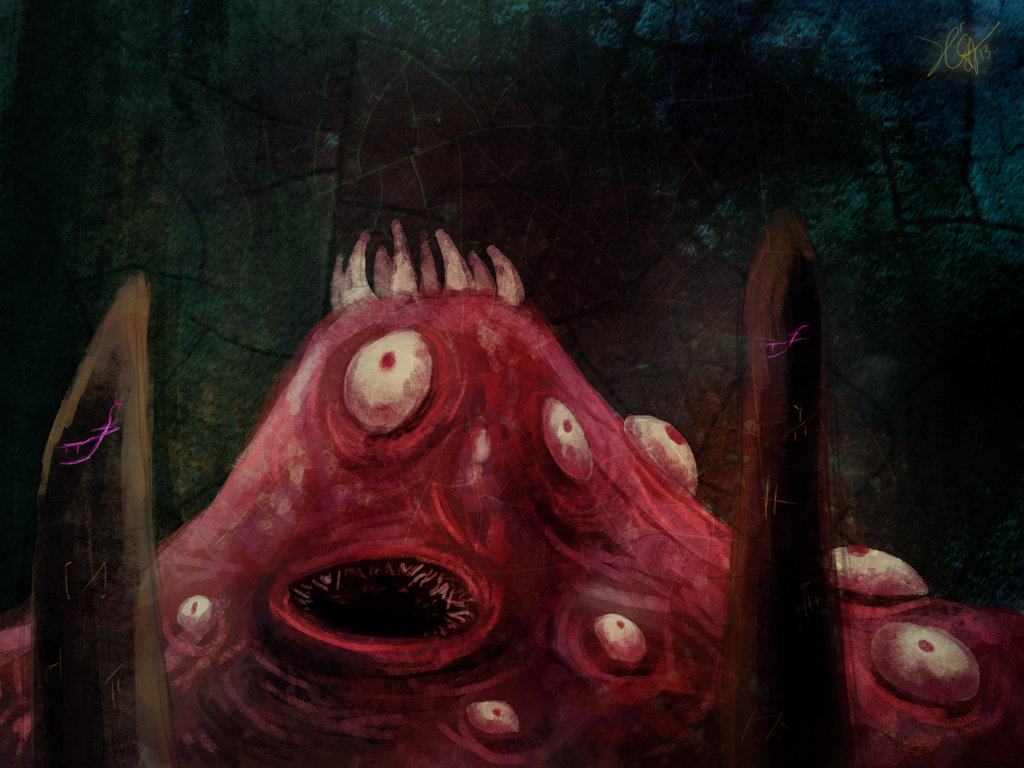
Mantorok – The Corpse God
The Bright Illusion **
“The Bright Illusion” is the weakest story in this collection. I might actually have given up here, but I am glad that I did not. My best description of this is Lovecraft in spaaaace! It features a human coerced into serving as an agent in a titanic battle between two beings so great in power and majesty they are worshiped as gods, although they are nothing of the sort.
Except, this story ends on a curiously hopeful note, which in the hands of lesser author would have been merely schmaltzy. We get “Love conquers all” mixed up with “There are fates worse than death”, but I am most fascinated by the way in which this is used to illustrate the fundamental inadequacy of the victor of the titanic battle of the “gods”, who is forced to admit that the worst it can actually do is kill you.
This is curiously not like Lovecraft, and piqued my interest despite the overall weakness of the story compared to the rest.
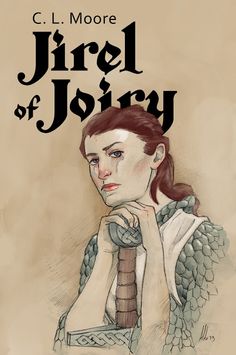
This is the most perfect image I could find of Jirel.
Black Kiss *****
“Black Kiss” was the story that rescued the whole collection for me. It helped that I stumbled upon a recently written blog post, Fandom: An Illustrative History (Part I: Origins and Tales From the Crypt). This blog post illuminated Moore’s work in particular, and my love of science fiction in general.
The blog post has a lot of sci-fi inside baseball that need not detain us here, but this part stuck out to me:
The Gothic is the beating bloody heart in any good traditional romance story and is what gives it the universal core so needed in fiction. White against black. Dark against Light. Hero against Villain. Eternal Life against Endless Death. Temptation against Virtue. It goes beyond the surface into weighty themes of the Ultimate, God, and True Justice. The knowledge of a battle between forces beyond both parties at play that haunt the scenery and the overall world behind the story. It underpins every action and decision, and the thought that salvation or damnation is a stone throw away is the most nail-biting experience of them all. Now those are stakes, and they were an integral part of all fiction until the second half of the 20th century where the worst thing that can happen to you is that a monster might kill you in the dark where you can't see it.
The term romance, as used here and in my own musings above, echos the sense in which J. R. R. Tolkien insisted that The Lord of the Rings was a romance, by which he, and I, means a story of heroism and adventure and wonder. This was a development of the earlier chanson de geste, such as the Song of Roland. Not a bodice-ripper, although you might actually be confused if you search of images of Jirel of Joiry. I picked the one image I found that matched the story best.
The moral universe of Jirel is explicitly a Christian one. Defeated, and in extremis, Jirel seeks the possibility of a weapon beyond mortal ken in the bowels of her castle. She has previously explored the forbidden passage with her chaplain, but now she disregards his entirely sensible advice to turn back and she descends into a strikingly imagined Hell to exact vengeance. Jirel reaches a point where she can progress no further without discarding the Crucifix she wears about her neck. She proceeds.
I have no idea what Moore’s beliefs, or personal life, were really like. But at the distance of 85 years, what struck me was she simply assumed her readers would understand the peril in which Jirel was placing herself. If you don’t think there are fates worse than death, this story won’t make any sense at all. The stakes are not death, but damnation.
Jirel finds that which she seeks in that mysterious tunnel under her castle. But what we seek, and what we really want, often aren’t truly the same things. Moore’s denouement is so characteristically feminine that I don’t know how to properly do it justice, other than to say that the image I selected for this short story is simply perfect, and all the others are irrelevant cheesecake.
I am also almost certain that Tim Powers lifted parts of this story into his works, particularly The Drawing of the Dark. There is a scene in “Black Kiss” with a spiral tunnel that Jirel transits, and Powers wrote of a spiral staircase under a brewery in Vienna that his protagonist descended to seek power, claustrophobically close. Once I saw the similarity here, I couldn’t unsee it in other places too.
A Tryst in Time ***
A time travel/reincarnation/love story. I was impressed with how well Moore blended the masculine adventure elements with star-crossed lovers. Not exactly my thing, but well-imagined.

Science laboratory, The University of Iowa, 1930s
Rights Information: There are no known copyright restrictions on this image. The digital file is owned by the University of Iowa Libraries, which is making it freely available with the request that the Libraries be credited as its source.
More information about this image: digital.lib.uiowa.edu/cdm/ref/collection/ictcs/id/7358
Greater than Gods ****
This short story feels to me like something written much later, for example Ballard’s work, with its elements of science run amok and managerial expertise turning into despotism. On the other hand, Heinlein’s first published story came out the same year as this, 1939, and Heinlein’s work is often similar to “Greater than Gods”.
Due to an accident in converging time streams, a scientist finds himself thrust upon the horns of a dilemma. In one future, his choice of a wife means that a pacifist, matriarchal, and quite stagnant society will occur. There is no more war, but no more technology or drive either, and that society’s grip on prosperity is slowly slipping away. In the other future, the other woman he is considering proposing to will bear him a son, who will beget a long line of sons who will dominate the Earth, and far, far beyond. This society is militaristic and regimented, but also capable of genuinely great things.
At this distance in time, I am fascinated by the dilemma Moore gives us. Today, no one could possibly propose this as a genuine dilemma in literature. I don’t think it could be done, because even I feel like maybe the peaceful but incompetent society is clearly better. However, the story makes no sense at all if you cannot truly feel that heroic deeds and exploring the universe and inventing new things are genuinely good things, which counterbalance the very very topical jingoism of this late 1930s tale.
Also, Moore superficially presents us with the thought that future history depends on whether each woman bears a daughter or a son first, but on another level, what really matters is the character of the mother, and what kind of child that union will create. I won’t spoil the choice the man makes in the end, which is what makes this story really transcendent.
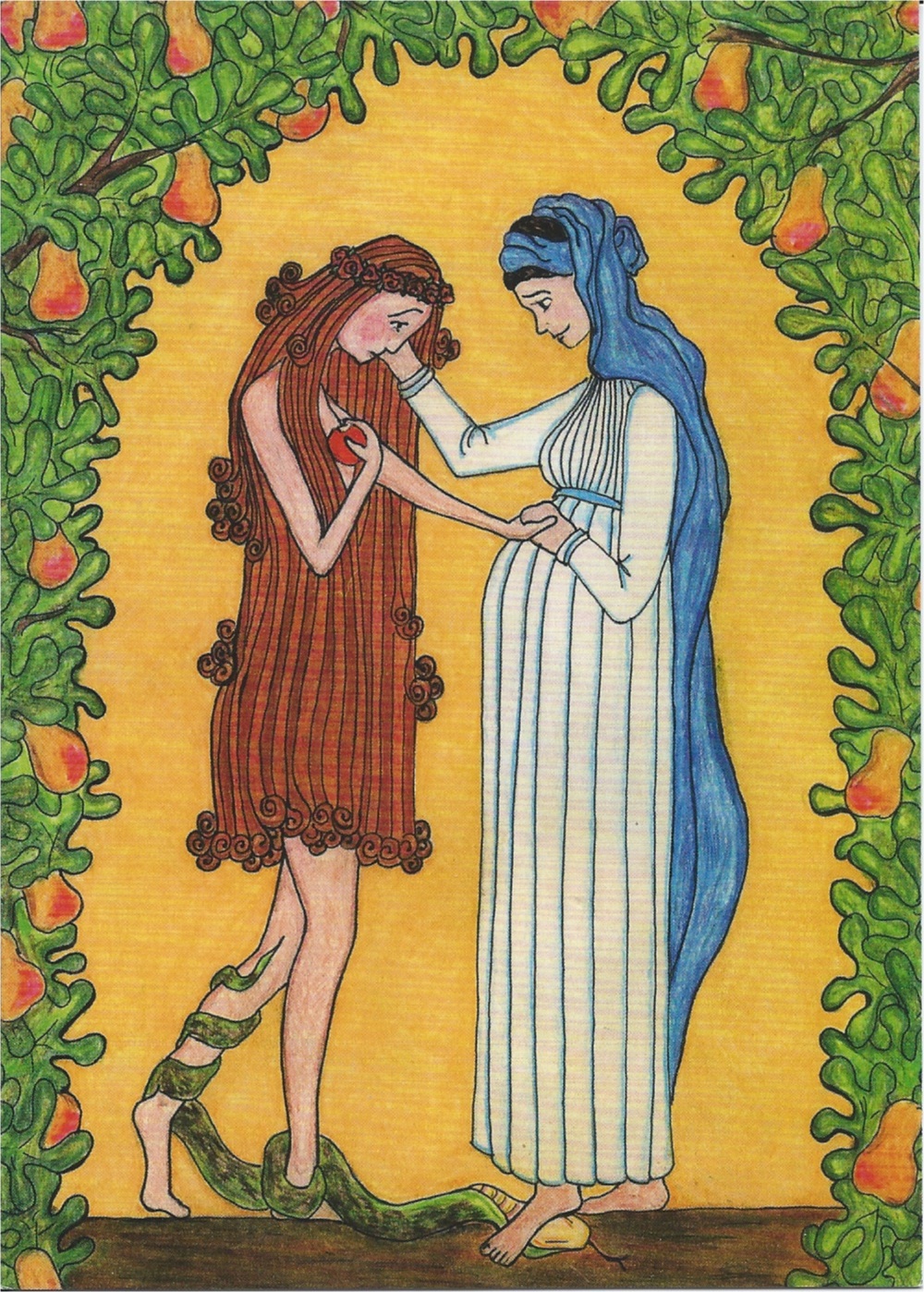
Mary and Eve
by Sister Grace Remington OCSO
Fruit of Knowledge *****
A dramatic retelling of the Fall of Man and the Temptation of Eve. Of Biblical stories, the sin of Adam and Eve retains popular currency even now, while other stories have begun to fade from our memories.
”Fruit of Knowledge” is perhaps a typical expression of the West in the twentieth century, insofar as the sin that truly separates Man from God is not simply disobedience, but sexual desire. On the other hand, if this story had been written today, Adam would have had sex with Lilith, not simply spoken to her and enjoyed her company for a brief time before the creation of Eve.
Like “Jirel of Joiry”, “Fruit of Knowledge” is set within a Christian moral universe. Moore sets the Fall shortly after the rebellion of Lucifer, an act which does not appear in the Hebrew tradition, but is instead from the Revelation to John. Also, there are hints that the Fall of Man was in some sense a happy accident, an event that was allowed to happen, because a greater destiny was in store. This is a speculation that goes back to Augustine of Hippo, so far as I know.
Finally, the children of Lilith, referenced by Moore here, were used by Tim Powers in his novels The Stress of Her Regard and Hide Me Among the Graves.
No Woman Born *****
Moore explicitly links this to Mary Shelley’s Frankenstein, through the dialogue of her characters. This is a tale of the creation of a monster by means of good intentions, and also truly terrifying to me.
Daemon ****
I think I can trace this short story to two Tim Powers novels. First, the setting, Atlantic sailing in the age of the buccaneers tinged with Vudun, is much like On Stranger Tides, the book that was optioned for Johnny Depp’s Pirates of the Caribbean movie. Next, The Drawing of the Dark, Powers’ contribution to the Arthurian legend, which hinges upon the titanic change in the world wrought by the first Christmas.
No, three, because the influence of the Grait God Pan, who was the center of Powers’ Earthquake Weather.
This was a fantastic little story, from near the end of Moore’s career. Poignant and well-crafted, with acute psychological insight. Not as striking as “Shambleau”, but far better written.
Vintage Season ***
A sad tale of time-traveling voyeurism, but a well-executed one.
Ben’s final verdict *****
I almost gave up on this collection, but I am glad I didn’t. Moore wrote some great stories, of a kind I don’t think you can find anymore. I can’t find any interviews or essays where Powers talks about Moore, but after reading this, I have a hard time imagining he didn’t read her works and find inspiration in them. Highly recommended.



Comments ()